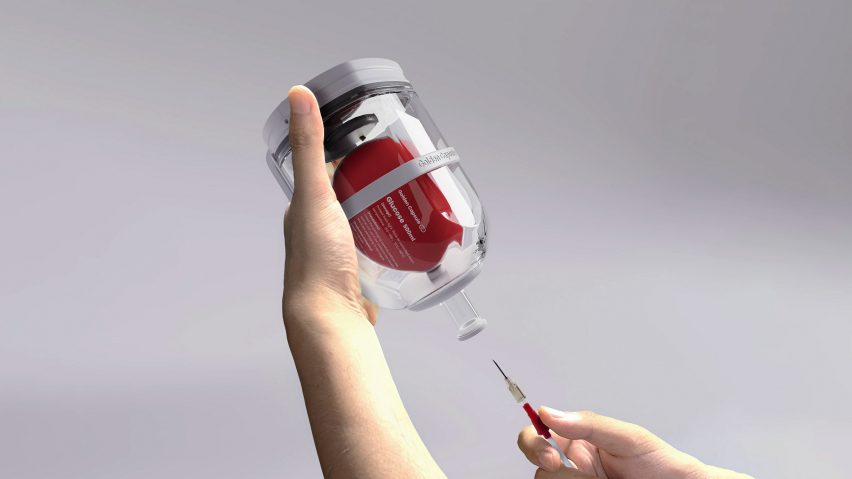The Golden Capsule – a non-powered, hands-free intravenous device designed by students from Hongik University has won this year's James Dyson Awards International prize.
Designed by Yujin Chae, Daeyeon Kim, Yeonghwan Shin and Yuan Bai, the device was developed in response to the limitations of existing intravenous (IV) packs identified following the Turkish-Syrian earthquakes in February 2023.
Unlike existing IV packs which rely on gravity and electricity to work, The Golden Capsule uses elastic forces and air pressure to function, meaning it can be used hands-free.
"The limitations of these traditional IV packs become even more pronounced in disaster situations such as earthquakes," the team told Dezeen. "In the aftermath of an earthquake, the site can be extremely challenging due to aftershocks, debris, and other hazards."
The device was made from a fluid-filled balloon that sits within a low-pressure transparent shell. Once opened, air enters the shell causing the balloon to shrink, releasing fluid into the patient.
A speed control device uses a roller mechanism to control air flow that allows medicine to be injected at a uniform speed, eliminating the need for manual squeezing.
The design also features a clip that allows the device to be securely attached to either the patient or medic.
According to the team, The Golden Capsule was intentionally designed to resemble existing IV packs to ensure the product was intuitive for use by medical professionals.
The team now hope to commercialise the device to replace existing IV packs in both emergency situations and hospitals too.
This year's James Dyson Awards has given three global prizes of equal merit – a Humanitarian, International and Sustainability winner – each receiving £30,000 to support the development of their inventions.
Piotr Tłuszcz from Poland was awarded the Humanitarian prize for The Life Chariot, an off-road medical evacuation ambulance designed for use by rescue teams in Ukraine.
The vehicle was designed to be towed by a hook-equipped vehicle and is low-weight with suspension for travelling across challenging terrain.
The vehicle is already being tested on the ground, and Piotr is now developing the design based on feedback from medics as he hopes to adapt the vehicle for use on mountainous terrain.
E-Coating, an eco-friendly roof and wall coating that reduces the heat absorption of buildings, was awarded this year's Sustainability prize.
Made from recycled waste glass, the coating was invented by Hoi Fung Ronaldo Chan and Can Jovial Xiao as a building cooling solution to reduce the need for air-conditioning.
"We invented E-Coating with a desire to help tackle the serious environmental problems our planet is facing," the duo told Sir James Dyson. "The prize money will allow us to further our research and development goals and start a company to take our invention to the next level."
With the award, they hope to advance the adhesion and application of E-Coating as well as explore formulas for indoor use.
Past winners of the James Dyson Award include an infection-sensing wound dresing by three PhD students from the Warsaw University of Technology and an affordable electric car conversion kit by Australian student Alexander Burton.

